Filter by

The environmental rule of law for oceans: designing legal solutions
Our oceans need a strong and effective environmental rule of law to protect them against increased pressures and demands, including climate change, pollution, fisheries, shipping and more. The environmental rule of law for oceans requires the existence of a set of rules and policies at multiple governance levels that appropriately regulate human activities at sea and ensure that pressures on th…
- Edition
- -
- ISBN/ISSN
- 9781009253741
- Collation
- xxxiii, 380 pages; illustration
- Series Title
- -
- Call Number
- 341.4 POZ t

International courts versus non-compliance mechanisms: comparative advantages…
The effective implementation of treaties is essential. This book examines the advantages of non-compliance mechanisms (NCMs) versus that of international courts and tribunals to support treaty fulfilment. It brings together globally-recognised names in international law, human rights law, environmental and climate change law, and trade law.
- Edition
- -
- ISBN/ISSN
- 9781009373913
- Collation
- xx, 508 pages; illustration
- Series Title
- -
- Call Number
- 341.5 VOI i

Transforming food systems under climate change through innovation
Our food systems have performed well in the past, but they are failing us in the face of climate change and other challenges. This book tells the story of why food system transformation is needed, how it can be achieved, and how research can be a catalyst for change. Written by a global interdisciplinary team of researchers, it brings together perspectives from multiple areas including climate,…
- Edition
- -
- ISBN/ISSN
- 9781009227216
- Collation
- 254 p
- Series Title
- -
- Call Number
- 338.1 CAM t

Environmental liberation education: diversity, mindfulness, and sustainabilit…
Environmental Liberation Education offers an easy-to-use, culturally responsive, and student-centered teaching approach to academic engagement and systemic change. It explains social-emotional tools and inquiry practices to discuss, reflect, and act for superdiverse student success, happiness, and global citizenship in a challenging, biodiverse world. The book presents three Transformative T…
- Edition
- -
- ISBN/ISSN
- 9781003364757
- Collation
- -
- Series Title
- -
- Call Number
- 370 RUB e
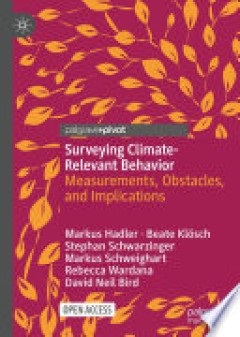
Surveying climate-relevant behavior : measurements, obstacles, and implications
This open access book discusses the contribution of sociology and survey research to climate research. The authors address the questions of which behaviors are of climate relevance, who is engaging in these behaviors, in which contexts do these behaviors occur, and which individual perceptions and values are related to them. Utilizing survey research, the book focuses on the measurement of clim…
- Edition
- 1
- ISBN/ISSN
- 9783030857967
- Collation
- xi, 159p. : ill.
- Series Title
- -
- Call Number
- 363.73874 MAR s
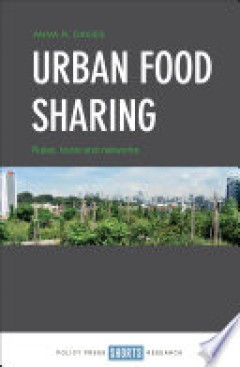
Urban Food Sharing : Rules, tools and networks
Available Open Access under CC-BY-NC licence. This book explores the history and current practice of food sharing. Illustrated by rich case studies from around the world, the book uses new empirical data to set an agenda for research and action. The book will be an important resource for researchers, policy makers and sharing innovators to explore the impacts and sustainability potential of suc…
- Edition
- -
- ISBN/ISSN
- 9781447349846
- Collation
- -
- Series Title
- -
- Call Number
- 363.8091732 ANN u
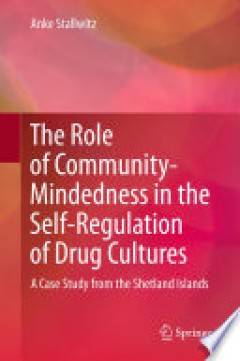
The Role of Community-Mindedness in the Self-Regulation of Drug Cultures : a …
This book analyzes heroin users and the drug subculture on the Shetland Islands, an area known for its geographical remoteness, rural character and relative wealth. It fills the scientific gap created by the conventional research in heroin research, which is usually conducted in urban areas and relies on treatment and prison populations. Based on qualitative, in-depth interviews with twenty-fou…
- Edition
- -
- ISBN/ISSN
- 9789400738614
- Collation
- 379p
- Series Title
- -
- Call Number
- 362.293 STA
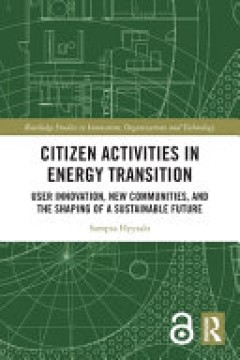
Citizen activities in energy transition : user innovation, new communities, a…
This book addresses the rapidly changing citizen roles in innovation, technology adoption, intermediation, market creation, and legitimacy building for low-carbon solutions. It links research in innovation studies, sustainability transitions, and science and technology studies, and builds a new approach for the study of user contributions to innovation and sociotechnical change. Citizen Activit…
- Edition
- 8
- ISBN/ISSN
- 9780367680251
- Collation
- xii, 190 p
- Series Title
- Routledge Studies in Innovation, Organizations and Technology,
- Call Number
- 333.794 HYY c
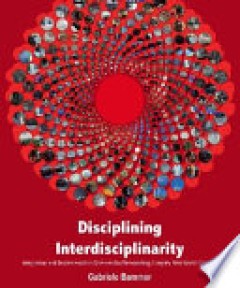
Disciplining interdisciplinarity: integration and implementation sciences for…
This book provides collaborative research teams with a systematic approach for addressing complex real-world problems like widespread poverty, global climate change, organised crime, and escalating health care costs. The three core domains are Synthesising disciplinary and stakeholder knowledge, Understanding and managing diverse unknowns, and Providing integrated research support for poli…
- Edition
- -
- ISBN/ISSN
- 9781922144287
- Collation
- 496 p
- Series Title
- -
- Call Number
- 300.72 BAM d
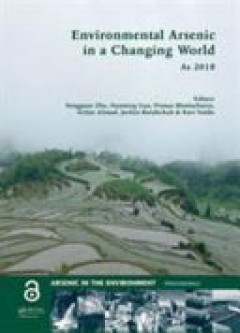
Environmental arsenic in a changing world : proceedings of the 7th Internatio…
The Congress ""Arsenic in the Environment"" offers an international, multi- and interdisciplinary discussion platform for research and innovation aimed towards a holistic solution to the problem posed by the environmental toxin arsenic, with significant societal impact. The Congress has focused on cutting edge and breakthrough research in physical, chemical, toxicological, medical, agricultural…
- Edition
- 9
- ISBN/ISSN
- 9781138486096
- Collation
- -
- Series Title
- -
- Call Number
- 363.73849 ZHU e
 Computer Science, Information & General Works
Computer Science, Information & General Works  Philosophy & Psychology
Philosophy & Psychology  Religion
Religion  Social Sciences
Social Sciences  Language
Language  Pure Science
Pure Science  Applied Sciences
Applied Sciences  Art & Recreation
Art & Recreation  Literature
Literature  History & Geography
History & Geography